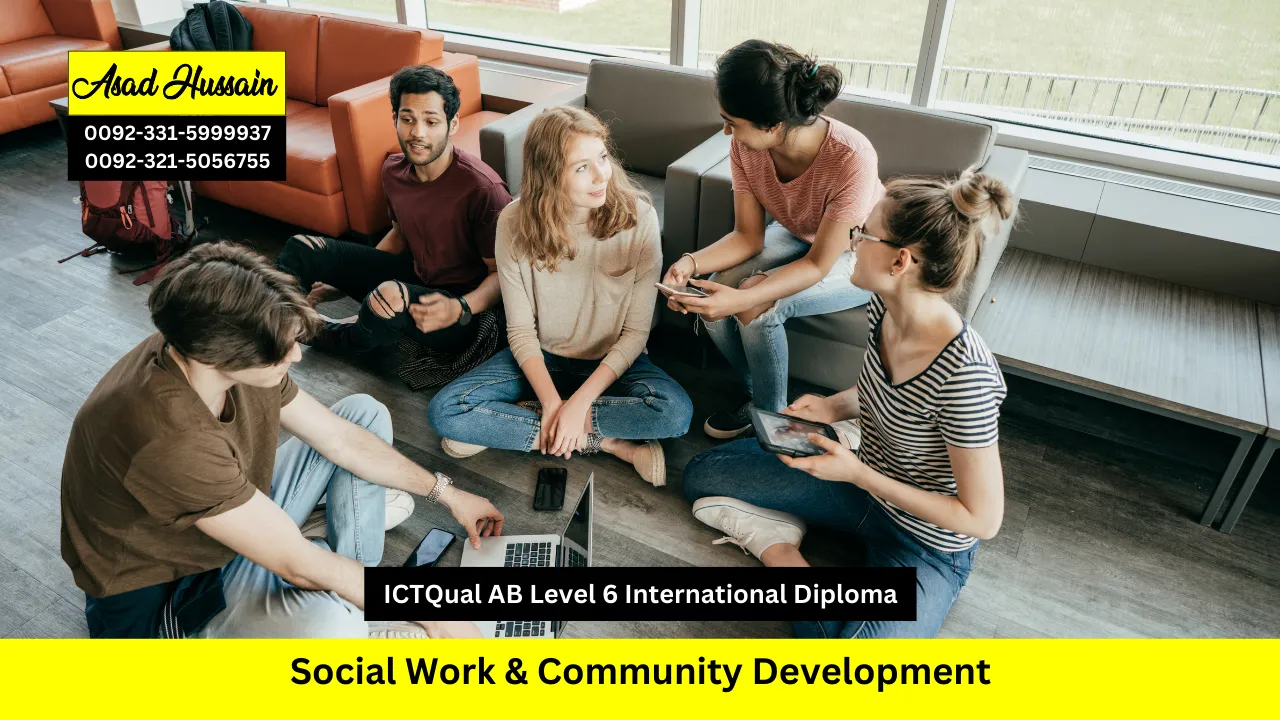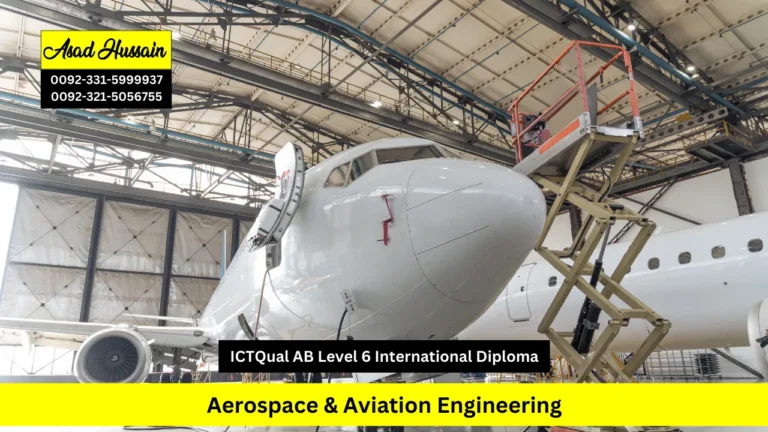The ICTQual AB Level 6 International Diploma in Social Work & Community Development is a globally recognized qualification designed to prepare learners for impactful careers in social welfare, community leadership, and sustainable development. In today’s rapidly changing world, the role of social workers and community developers has become more critical than ever, addressing complex social challenges, fostering inclusivity, and empowering individuals and groups to improve their quality of life.
ICTQual ABLevel 6 International Diploma in Social Work & Community Development provides a comprehensive three-year program with 360 credits, tailored to meet the needs of both fresh learners seeking a professional pathway and experienced practitioners aiming to enhance their expertise. The curriculum integrates theoretical knowledge with real-world applications, enabling learners to develop strong analytical, problem-solving, and interpersonal skills essential for professional practice.
Through this course, learners will gain an in-depth understanding of social policies, human behavior, community engagement strategies, social justice principles, and sustainable development practices. Practical case studies, projects, and assignments ensure that students not only master academic knowledge but also acquire hands-on experience in addressing real community issues.
Graduates of this program will be equipped to take on leadership roles in non-governmental organizations (NGOs), social service agencies, public policy institutions, healthcare and education sectors, and international development organizations. They will develop the ability to design, implement, and evaluate programs that bring positive social change and long-term community impact.With a strong emphasis on ethics, cultural sensitivity, and innovation, this diploma opens pathways for learners to become effective social workers, community developers, and advocates of social justice at local, national, and international levels.
Program Highlights
Study Units
Year 1 – Foundation in Social Work & Community Development
- Introduction to Social Work Practice
- Principles of Community Development
- Human Behaviour and Social Environment
- Communication Skills for Social Workers
- Social Policy and Legislation
- Ethics and Professional Conduct in Social Work
- Sociology for Community Practice
- Introduction to Psychology in Social Work
- Health, Wellbeing, and Social Care
- Diversity and Inclusion in Communities
- Introduction to Research Methods
- Fundamentals of Case Management
Year 2 – Intermediate Social Work & Community Development
- Advanced Social Work Practice
- Community Engagement Strategies
- Social Work with Children and Families
- Mental Health and Wellbeing
- Social Work with Vulnerable Adults
- Research Methods and Data Analysis
- Project Planning and Management in Communities
- Policy Implementation and Evaluation
- Leadership and Management in Social Work
- Advocacy and Social Justice
- Crisis Intervention and Counselling Skills
- Professional Development and Reflective Practice
Year 3 – Advanced Practice & Leadership in Social Work
- Strategic Community Development
- Advanced Case Management Techniques
- Policy Analysis and Reform
- Leadership in Social Work Practice
- Community Project Design and Evaluation
- Risk Assessment and Safeguarding
- Advanced Research and Evidence-Based Practice
- Social Work in Multicultural Contexts
- Ethics and Decision-Making in Complex Cases
- Managing Organisations and Teams in Social Care
- Innovation in Community Development
- Capstone Project in Social Work & Community Development
The ICTQual AB Level 6 International Diploma in Social Work & Community Development is designed for learners who are passionate about making a meaningful impact in society. To ensure that learners can successfully complete the program and benefit from its academic and practical approach, applicants must meet the following entry requirements.
Age Requirements
- Applicants must be at least 18 years of age at the time of enrollment.
- No maximum age limit, as both fresh learners and experienced professionals are encouraged to apply.
- Mature learners with relevant life experience in community or social work may also be considered.
Educational Requirements
- A recognized Level 5 qualification or equivalent in a related field (such as Social Sciences, Public Health, or Community Studies).
- Applicants with a high school diploma plus significant relevant experience may also be considered.
- Strong academic foundation in social sciences or humanities is preferred.
Professional Experience
- Fresh learners without prior work experience are welcome to apply, provided they meet the educational requirements.
- Professionals with at least 2–3 years of verifiable experience in social work, community development, or related fields may receive additional recognition during assessment.
- Voluntary experience in NGOs, charities, or community-based organizations will be considered an advantage.
English Language Proficiency
- Applicants must demonstrate proficiency in English to successfully engage with course materials and assessments.
- Acceptable qualifications include IELTS 5.5 (or equivalent) or evidence of prior education in English.
- Those who do not meet the language requirement may be asked to complete an English proficiency test.
The entry requirements are designed to ensure that learners are equipped with the academic foundation, professional capacity, and communication skills necessary for success. Whether you are a fresher seeking a career in social welfare or an experienced practitioner looking to expand your expertise, the ICTQual AB Level 6 International Diploma in Social Work & Community Development offers a clear pathway to achieve your professional goals.
The ICTQual AB Level 6 International Diploma in Social Work & Community Development equips learners with the knowledge, skills, and practical expertise needed to address complex social challenges and create sustainable community impact. Spread over three years, the program covers foundational, intermediate, and advanced levels of practice. Each unit is designed with specific learning outcomes that ensure graduates are prepared for professional roles in social work, community leadership, and development.
Year 1 – Foundation in Social Work & Community Development
Introduction to Social Work Practice
- Understand the history, scope, and purpose of social work in different contexts.
- Apply basic frameworks to assess individual and community needs.
- Demonstrate awareness of professional roles and responsibilities.
Principles of Community Development
- Explain the core principles and models of community development.
- Identify strategies to mobilize communities for collective action.
- Apply participatory approaches to promote social inclusion.
Human Behaviour and Social Environment
- Analyze human development across the lifespan.
- Examine the impact of environment, culture, and society on behavior.
- Apply psychosocial theories to real-world social work cases.
Communication Skills for Social Workers
- Demonstrate effective verbal and non-verbal communication techniques.
- Apply active listening and empathy in client interactions.
- Use digital tools for professional and ethical communication.
Social Policy and Legislation
- Understand the role of social policy in shaping welfare systems.
- Analyze key legislation affecting social work and community practice.
- Apply policy knowledge to practical case scenarios.
Ethics and Professional Conduct in Social Work
- Recognize ethical dilemmas in social work practice.
- Apply professional codes of conduct to decision-making.
- Evaluate the role of values in promoting social justice.
Sociology for Community Practice
- Explain key sociological theories relevant to social work.
- Analyze the influence of social institutions on individual lives.
- Apply sociological insights to community-based interventions.
Introduction to Psychology in Social Work
- Understand basic psychological concepts relevant to social work.
- Analyze the relationship between cognition, emotion, and behavior.
- Apply psychological theories to client care and support.
Health, Wellbeing, and Social Care
- Assess factors influencing physical and mental wellbeing.
- Apply principles of holistic health in social care contexts.
- Collaborate with healthcare professionals to support clients.
Diversity and Inclusion in Communities
- Recognize the importance of cultural sensitivity in practice.
- Apply inclusive strategies to engage diverse communities.
- Evaluate barriers to equality and propose solutions.
Introduction to Research Methods
- Understand basic research designs and approaches.
- Apply data collection tools such as surveys and interviews.
- Analyze simple data to inform community practice.
Fundamentals of Case Management
- Explain the role of case management in social work.
- Apply structured approaches to assess client needs.
- Develop and monitor simple care plans.
Year 2 – Intermediate Social Work & Community Development
Advanced Social Work Practice
- Apply evidence-based approaches to complex social work cases.
- Use critical thinking to evaluate intervention strategies.
- Demonstrate professional autonomy in decision-making.
Community Engagement Strategies
- Design and implement community mobilization programs.
- Apply participatory approaches to build trust.
- Evaluate the outcomes of community engagement efforts.
Social Work with Children and Families
- Assess the needs of children and families in diverse contexts.
- Apply child protection frameworks to safeguard wellbeing.
- Develop family-centered intervention strategies.
Mental Health and Wellbeing
- Identify mental health conditions affecting individuals and groups.
- Apply psychosocial interventions to support clients.
- Collaborate with mental health professionals to enhance care.
Social Work with Vulnerable Adults
- Understand the challenges faced by vulnerable populations.
- Apply safeguarding principles to protect at-risk individuals.
- Design interventions that promote independence and dignity.
Research Methods and Data Analysis
- Apply advanced research methodologies to social work contexts.
- Use data analysis techniques to interpret research findings.
- Present evidence to support policy or practice decisions.
Project Planning and Management in Communities
- Design community-based projects with clear objectives.
- Apply project management tools to monitor progress.
- Evaluate project outcomes for long-term sustainability.
Policy Implementation and Evaluation
- Translate policy frameworks into practical interventions.
- Apply evaluation tools to measure policy effectiveness.
- Recommend policy improvements based on evidence.
Leadership and Management in Social Work
- Apply leadership theories to professional practice.
- Manage teams effectively within social service organizations.
- Demonstrate conflict resolution and decision-making skills.
Advocacy and Social Justice
- Apply advocacy skills to promote client rights.
- Evaluate the impact of social injustice on communities.
- Develop strategies to influence public policy.
Crisis Intervention and Counselling Skills
- Apply intervention techniques in crisis situations.
- Use counseling methods to support individuals in distress.
- Evaluate the effectiveness of crisis responses.
Professional Development and Reflective Practice
- Engage in reflective practice to improve performance.
- Create a professional development plan aligned with career goals.
- Demonstrate lifelong learning and adaptability.
Year 3 – Advanced Practice & Leadership in Social Work
Strategic Community Development
- Design long-term strategies for sustainable community change.
- Apply strategic planning tools to social development projects.
- Evaluate the impact of development initiatives.
Advanced Case Management Techniques
- Apply complex case management frameworks.
- Coordinate multidisciplinary teams for client care.
- Evaluate case outcomes using advanced monitoring tools.
Policy Analysis and Reform
- Critically analyze existing social policies.
- Recommend reforms to address gaps in service delivery.
- Use evidence to influence policy debates.
Leadership in Social Work Practice
- Apply transformational leadership skills in social work.
- Manage ethical dilemmas at organizational levels.
- Mentor and guide junior professionals in practice.
Community Project Design and Evaluation
- Design innovative projects addressing emerging social issues.
- Apply evaluation models to assess project success.
- Recommend improvements based on evidence-based findings.
Risk Assessment and Safeguarding
- Apply advanced risk assessment tools in practice.
- Implement safeguarding procedures for vulnerable groups.
- Monitor and evaluate safeguarding systems.
Advanced Research and Evidence-Based Practice
- Design and conduct independent research projects.
- Critically evaluate academic literature for application in practice.
- Integrate research findings into community interventions.
Social Work in Multicultural Contexts
- Apply cultural competence frameworks in practice.
- Analyze the role of culture in shaping client experiences.
- Develop interventions for multicultural environments.
Ethics and Decision-Making in Complex Cases
- Apply advanced ethical reasoning to complex cases.
- Balance competing rights and responsibilities in decision-making.
- Document and defend ethical judgments in practice.
Managing Organisations and Teams in Social Care
- Apply management strategies to social service organizations.
- Monitor performance using key management indicators.
- Lead organizational change for service improvement.
Innovation in Community Development
- Apply innovative approaches to solve community challenges.
- Integrate technology into social and community practice.
- Evaluate the effectiveness of innovative interventions.
Capstone Project in Social Work & Community Development
- Design and implement an independent capstone project.
- Apply research, theory, and practice to real-world challenges.
- Present findings and recommendations to academic and professional audiences.
By completing the ICTQual AB Level 6 International Diploma in Social Work & Community Development, learners will graduate with advanced knowledge, practical expertise, and leadership skills to address real-world social challenges. They will be prepared to work in diverse professional settings such as NGOs, social service agencies, healthcare systems, and international development organizations. The program ensures that learners not only understand the theory but can also apply innovative, ethical, and evidence-based practices to drive positive social change and sustainable community growth.
The ICTQual AB Level 6 International Diploma in Social Work & Community Development is tailored for individuals who aspire to build careers in social work, community leadership, and development. This program attracts a wide range of learners with different backgrounds but a shared passion for creating positive social impact.
Fresh Graduates
- Individuals who have recently completed their secondary or undergraduate studies.
- Learners looking for an internationally recognized qualification to enter the social work sector.
- Students passionate about social justice, welfare, and community empowerment.
Current Professionals
- Practitioners working in NGOs, social service agencies, healthcare, or educational institutions.
- Professionals seeking to strengthen their expertise in community engagement and social policy.
- Individuals aiming to progress into supervisory or leadership roles.
Community Leaders and Volunteers
- Grassroots leaders involved in community mobilization or development projects.
- Volunteers in charities, non-profits, or welfare organizations seeking formal training.
- Activists passionate about advancing equality, inclusion, and social justice.
Aspiring Leaders in Social Work
- Learners aiming to specialize in project management and strategic community planning.
- Individuals preparing for leadership or management positions in social care organizations.
- Those interested in policy design, evaluation, and reform for long-term social impact.
Academic and Professional Growth Seekers
- Candidates planning to pursue postgraduate studies in social sciences or development studies.
- Learners seeking international exposure and transferable professional skills.
- Individuals motivated to combine research, practice, and innovation in social work.
The ICTQual AB Level 6 International Diploma in Social Work & Community Development is ideal for learners at all stages—freshers, experienced professionals, and community leaders—who share a common goal of driving social change. It empowers learners with the academic foundation, practical expertise, and leadership skills needed to make a meaningful and lasting difference in communities worldwide.
As an approved ICTQual AB center, we provide learners with a clear and structured pathway to achieve the ICTQual AB Level 6 International Diploma in Social Work & Community Development. Learners must enroll with us to access all learning materials, assignments, and assessments.
Route 1: Experienced Professionals
- Designed for professionals with at least 6 years of verifiable experience in social work, community development, or related fields.
- Learners can demonstrate their competence through prior experience, which may reduce the number of assignments required.
- This route allows experienced practitioners to fast-track certification while validating their skills and professional expertise.
- Recognition of prior learning ensures that your existing knowledge and achievements are formally accredited.
Route 2: Fresh Learners
- Designed for individuals new to the field or without significant professional experience.
- Fresh learners are required to complete all 36 assignments throughout the three-year program.
- This route ensures a thorough understanding of both theoretical knowledge and practical skills in social work and community development.
- Assignments cover topics such as social policy, case management, community engagement, leadership, and ethics, providing a comprehensive learning experience.
By enrolling with our approved ICTQual AB center, learners benefit from structured guidance, professional support, and access to resources that ensure successful completion of the diploma and international recognition of their qualifications.







